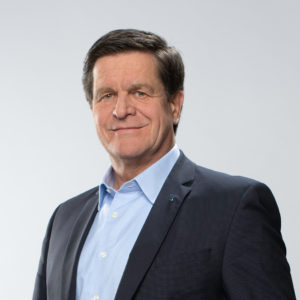The K 2019 trade fair for plastics and rubber will take place from 16 – 23 October 2019 in Düsseldorf, Germany, where the VDMA Plastics and Rubber Machinery Association will be focusing on the recycling sector. A series of interviews will shed light on why it is doing this and the significance of the „Circular Economy“ for member companies of the association. In the first contribution, Ulrich Reifenhäuser, Chairman of the Board of Management of the trade association, gives his views on the subject. The amount of plastic waste is growing steadily worldwide. In order to use resources sustainably, waste has to be given a value, it ought to be recycled and not disposed of, as is still the case in many countries around the world. Ulrich Reifenhäuser is convinced that there is a need for a comprehensive change of awareness in society. The end consumers need to be educated and informed. At the same time, an appropriate political framework has to be provided. Mechanical engineering supports resource-efficient production and recycling technologies, but brand owners also play a key role in promoting the acceptance of products made from recycled materials.

Why is a circular economy important for plastics?
Ulrich Reifenhäuser:
The topic of plastic waste has become increasingly important because the amount of litter is growing. This is due to an expanding global population and rising prosperity in many emerging economies. The mountains of waste are piling up, especially in Asia. We also have problems with this in Europe. In Scandinavia, the Netherlands, Germany, Austria and Switzerland the rate of recycling is truly excellent, but in Mediterranean countries, on the other hand, it’s rather poor. It is clear, therefore, that the world of plastics needs to change. Discussions are currently underway, but this is not yet noticeable in the waste sector.
Why is that?
Ulrich Reifenhäuser:
This is a very complex and multi-layered problem. It’s paradoxical. Plastics are an ideal material for many applications. They are light, easy to process, relatively inexpensive and available in sufficient quantities. Because of these benefits, their importance to competing materials is constantly increasing. This is positive. However, plastics are not usually dealt with correctly after use. Instead of being collected, they’re thrown away. This is negative, and the real major issue at hand.
How can you change the behaviour of entire nations of consumers?
Ulrich Reifenhäuser:
By educating and appealing to the responsibility of consumers. Legislation is also a good way to do this. It’s extremely important to attach value to plastic waste. This is something that needs to be approached from a political perspective. The best strategy here is to set recycling quotas for new plastics products. If quotas are in place, plastics processors will suddenly need recycled material. This will open up a new market. It may well be that high-quality recycled material costs twice as much as brand-new goods, but doubling the price won’t make a difference when it comes to plastics products as their properties are far superior to those of other materials such as glass, metal or paper.
But end consumers are watching out for every last cent.
Ulrich Reifenhäuser:
That’s true, but that wouldn’t be a problem anymore if laws were in place to stipulate that all plastics products need to comprise 30 % recycled material. The preconditions would be the same for everyone then. It would take perhaps three years for us in Europe and also in Germany to suddenly have a completely different recycling industry.
So it can’t be done without political guidelines?
Ulrich Reifenhäuser:
Politics is necessary because plastic waste is a problem for society as a whole. One group alone can’t do much about it. It’s about being aware that you can’t just throw rubbish away.
What can mechanical engineering do to help?
Ulrich Reifenhäuser:
Mechanical engineering can support the process of sustainable plastics management. As a manufacturer of machines for processing plastics, we develop resource-efficient processes which allow a reduced use of plastics. One example is using thinner films that have the same protective properties as thicker ones. We also develop machines that produce products with no waste at all. All waste from production is immediately recycled. All these measures concern production. Regarding use, mechanical engineering provides all the technologies which enable plastic waste to be recycled.
Some plastic waste is difficult to recycle. What should you do?
Ulrich Reifenhäuser:
Recyclability must be taken into account from the very beginning, as early as the product design stage. Today, various materials are often incorporated into a product without any real necessity. This limits its recyclability. Some plastics are not compatible with each other when being recycled. It’s not the case that you can always make a new, usable product from different plastics. The chemical industry is a key player in the further development of recyclability, but the requirements placed on a plastics product often have to be reduced as well. For example, barrier layers are currently integrated into the films used to package cheese, which extend its shelf life. The barrier layers are extremely difficult to separate and thus to recycle. If the barrier layers were to be reduced below 5 %, the shelf life might also be reduced, but the films could be recycled much more easily. In any case, the question arises as to whether cheese needs to be kept for several weeks or even months.
Are plastics processors obliged to do this?
Ulrich Reifenhäuser:
The brand owners have to stipulate that certain plastics products may only be used for certain applications. This is already happening today, but it will take a while for it to be enforced. In any case, mechanical engineering is not the bottleneck. Also, legal requirements often still hinder the use of recycled material.
Scandinavian countries have taken a different approach by choosing to focus on incinerating plastic waste.
Ulrich Reifenhäuser:
Incineration is a quite good secondary use. There have been no landfills in northern Europe for quite some time. The focus is very much on waste incineration there. In order to incinerate waste, and we’re talking about all non-recyclable household waste, and generate energy from the incineration process at the same time, you need fuel. If you reach the firing temperatures with used plastics, you have two advantages. Firstly, plastics are used a second time, including and – above all – those which aren’t recyclable. Secondly, the energy from the incineration process can be used further, for industrial processes, for example. Incineration is also a particularly good option if you want to tackle the waste problem quickly, for instance in emerging countries where plastic waste has not yet been recycled at all.
What is the best way to solve the problem of plastic waste?
Ulrich Reifenhäuser:
There is no perfect solution – you have to explore various ways. We need modified plastics and we need modified products. But above all, people need to learn to take responsibility. They have to recognise that they shouldn’t throw plastics away, but instead need to make sure to properly reuse them. Education is key: through politics, at school and at university. For example, more chairs for recycling management are required.
About VDMA Plastics and Rubber Machinery
More than 230 companies are members of the association, covering more than 90 % of the industry’s production activities in Germany. 10 % of its member companies come from Austria, Switzerland and France. The German member companies represent sales of EUR 7 billion in core machinery and EUR 10 billion including peripheral technology. Every fourth plastics machine produced in the world comes from Germany; the export rate is 70 %. Ulrich Reifenhäuser, Member of the Management Board of the Reifenhäuser Group, is the chairman of the association.
